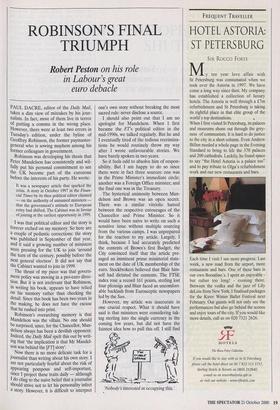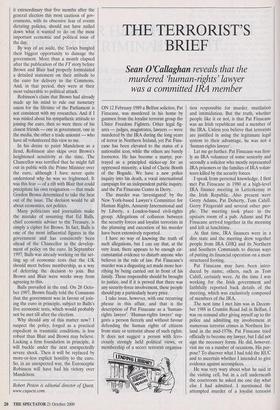ROBINSON'S FINAL TRIUMPH
PAUL DACRE, editor of the Daily Mail, takes a dim view of mistakes by his jour- nalists. In fact, most of them live in terror of putting a comma in the wrong place. However, there were at least two errors in Tuesday's edition, under the byline of Geoffrey Robinson, the former paymaster- general who is sowing mayhem among his former colleagues in government.
Robinson was developing his thesis that Peter Mandelson has consistently and wil- fully put his personal commitment to see the UK become part of the eurozone before the interests of his party. He wrote: It was a newspaper article that sparked the crisis. A story in October 1997 in the Finan- cial Times by its then political editor claimed — on the authority of unnamed ministers —an that the government's attitude to Europe entry had shifted. The Cabinet was in favour of joining at the earliest opportunity in 1999.
I was that political editor and the story is forever etched on my memory. So here are a couple of pedantic corrections: the story Was published in September of that year, and it said a growing number of ministers were pressing for the UK to join 'around the turn of the century, possibly before the next general election'. It did not say that the Cabinet wanted to join in 1999. The thrust of my piece was that govern- ment policy was moving in a pro-euro direc- tion. But it is not irrelevant that Robinson, in writing his book, appears to have relied on his memory rather than checking the detail. Since this book has been two years in the making, he does not have the excuse that he rushed into print. Robinson's overarching memory is that Mandelson was the villain. No one should be surprised, since, for the Chancellor, Man- delson always has been a devilish opponent. Indeed, the Daily Mail spelt this out by writ- ing that 'the implication is that Mr Mandel- son was behind the [FT] story'. Now there is no more delicate task for a Journalist than writing about his own story. I am not particularly fearful about the risk of appearing pompous and self-important, since I project these traits daily — although I do cling to the naive belief that a journalist should strive not to let his personality infect a story. However, it is difficult to interpret one's own story without breaking the most sacred rule: never disclose a source.
I should also point out that I am no apologist for Mandelson. When I first became the FT's political editor in the mid-1990s, we talked regularly. But he and I eventually tired of the tedious recrimina- tions he would routinely throw my way after I wrote unfavourable stories. We have barely spoken in two years.
So it feels odd to absolve him of respon- sibility. But I am happy to do so since there were in fact three sources: one was in the Prime Minister's immediate circle; another was a Foreign Office minister; and the final one was in the Treasury.
The hysterical animosity between Man- delson and Brown was an open secret. There was a similar vitriolic hatred between the respective entourages of the Chancellor and Prime Minister. So it would have been naive to write on such a sensitive issue without multiple sourcing from the various camps. I was unprepared for the reaction to my article. Largely, I think, because I had accurately predicted the contents of Brown's first Budget, the City convinced itself that the article pre- saged an imminent prime ministerial state- ment on the date of UK membership of the euro. Stockbrokers believed that Blair him- self had dictated the contents. The FTSE index rose a record 161 points, sterling lost four pfennigs and Blair faced an uncomfort- able backlash from Eurosceptic newspapers led by the Sun.
However, my article was inaccurate in one crucial respect. What it should have said is that ministers were considering tak- ing sterling into the single currency in the coming few years, but did not have the faintest idea how to pull this off. I still find Nobody's interested in occupying this.' it extraordinary that five months after the general election this most cautious of gov- ernments, with its obsessive fear of events dictating policies, should not have nailed down what it wanted to do on the most important economic and political issue of the day.
By way of an aside, the Tories bungled their biggest opportunity to damage the government. More than a month elapsed after the publication of the FT story before Brown and Blair had properly formulated a detailed statement on their attitude to the euro for delivery to the Commons. And, in that period, they were at their most vulnerable to political attack.
Robinson's claim that Brown had already made up his mind to rule out monetary union for the lifetime of the Parliament is not consistent with my researches. And if I was misled about his sympathetic attitude to joining the euro, then so were three of his closest friends — one in government, one in the media, the other a trade unionist — who have all volunteered this view to me.
In his desire to paint Mandelson as a fiend, Robinson also skips over Brown's heightened sensitivity at the time. The Chancellor was terrified that he might fall out in public with the Prime Minister over the euro, although I have never quite understood why he was so frightened. It was this fear — of a rift with Blair that could precipitate his own resignation — that made Gordon Brown determined to take the heat out of the issue. The decision would be all about economics, not politics.
Many politicians and journalists make the mistake of assuming that Ed Balls, chief economic adviser to the Treasury, is simply a cipher for Brown. In fact, Balls is one of the most influential figures in the government and has consistently been ahead of the Chancellor in the develop- ment of policy on the euro. In September 1997, Balls was already working on the set- ting up of economic tests that the UK should meet before membership, as a way of deferring the decision to join. But Brown and Blair were weeks away from agreeing to this.
Balls prevailed in the end. On 28 Octo- ber 1997, Brown finally told the Commons that the government was in favour of join- ing the euro in principle, subject to Balls's five economic tests, which would probably not be met till after the election.
Why should any of this matter now? I suspect the policy, forged as a practical expedient in traumatic conditions, is less robust than Blair and Brown may believe. Lacking a firm foundation in principle, it will buckle under the next unexpectedly severe shock. Then it will be replaced by more-or-less explicit hostility to the euro. So, in an unexpected way, the Eurosceptic Robinson will have had his victory over Mandelson.
Robert Peston is editorial director of Quest, www.csquest.com.


























































































 Previous page
Previous page